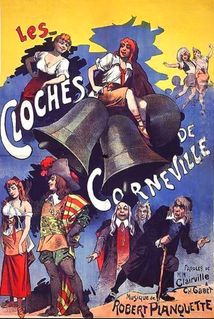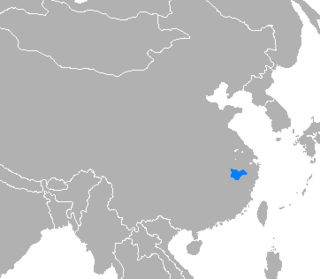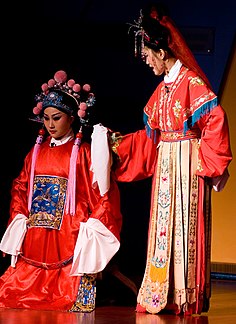
Operetta is a genre of light opera, light in terms both of music and subject matter.
Opera buffa is a genre of opera. It was first used as an informal description of Italian comic operas variously classified by their authors as commedia in musica, commedia per musica, dramma bernesco, dramma comico, divertimento giocoso.

Anhui, is a province of the People's Republic of China located in the eastern region of the country. The province is located across the basins of the Yangtze River and the Huai River, bordering Jiangsu to the east, Zhejiang to the southeast, Jiangxi to the south, Hubei to the southwest, Henan to the northwest, and Shandong for a short section in the north.

In opera, verismo was a post-Romantic operatic tradition associated with Italian composers such as Pietro Mascagni, Ruggero Leoncavallo, Umberto Giordano, Francesco Cilea and Giacomo Puccini. Verismo as an operatic genre had its origins in an Italian literary movement of the same name. This was in turn related to the international literary movement of naturalism as practised by Émile Zola and others. Like naturalism, the verismo literary movement sought to portray the world with greater realism. In so doing, Italian verismo authors such as Giovanni Verga wrote about subject matter, such as the lives of the poor, that had not generally been seen as a fit subject for literature.

Comic opera denotes a sung dramatic work of a light or comic nature, usually with a happy ending.

Huizhou or Hui, is a group of closely related varieties of Chinese spoken over a small area in and around the historical region of Huizhou, in about ten or so mountainous counties in southern Anhui, plus a few more in neighbouring Zhejiang and Jiangxi.

Anhui is a province of China, known musically for a wide array of folk and classical styles. The Huangmei opera, though originally from Hubei, has a long history in Anhui, especially Anqing City, from which it spread to Beijing, Shanghai and elsewhere. A notable Huangmei opera figure was Yan Fengying. Huangmei opera has become internationally renowned, especially following the 1986 performance of an adaptation of William Shakespeare's Much Ado About Nothing by the Anhui Provincial Huangmei Opera Troupe. There is also a less common form of Hui opera.

Huangshan, is a prefecture-level city in southern Anhui province, People's Republic of China. Huangshan means Yellow Mountain in Chinese and the city is named after the famously scenic Yellow Mountains which cover much of the city's vast geographic expanse. The prefectural city of Huangshan includes three urban districts and four counties. The urban center of Huangshan was originally the city of Tunxi, and is now called Tunxi District. Locals still call the city Tunxi to distinguish urban core from other parts of Huangshan.
Opéra-ballet is a genre of French Baroque lyric theatre that was most popular during the 18th century, combining elements of opera and ballet, "that grew out of the ballets à entrées of the early seventeenth century". It differed from the more elevated tragédie en musique as practised by Jean-Baptiste Lully in several ways. It contained more dance music than the tragédie, and the plots were not necessarily derived from classical mythology and allowed for the comic elements, which Lully had excluded from the tragédie en musique after Thésée (1675). The opéra-ballet consisted of a prologue followed by a number of self-contained acts, often loosely grouped around a single theme. The individual acts could also be performed independently, in which case they were known as actes de ballet.

Yu opera, or Yuju opera, sometimes known as Henan bangzi, is one of China's famous national opera forms, alongside Peking opera, Yue opera, Huangmei opera and Pingju. Henan province is the origin of Yu opera. Henan's one-character abbreviation is "豫" (yù), and thus the opera style was officially named "豫剧" (Yùjù) after the founding of the People's Republic of China. The area where Yu opera is most commonly performed is in the region surrounding the Yellow River and Huai River. According to statistical figures, Yu opera was the leading opera genre in terms of the number of performers and troupes. Outside Henan, provinces such as Hubei, Anhui, Jiangsu, Shandong, Hebei, Beijing, Shanxi, Shaanxi, Gansu, Qinghai, Xinjiang, all have professional Yu opera troupes. There is also a troupe in Kaohsiung, Taiwan.

Huīzhōu now is a district in southeastern China, located in Huangshan City – the southernmost region of Anhui Province. Before the 1987 administrative division adjustment, Huizhou was a region corresponding to Huangshan city and Jixi County of Anhui Province, plus Wuyuan County in northeastern Jiangxi Province. Anhui, the name of the province, is a portmanteau word combining the first characters of Anqing and Huizhou.

The Teatro de la Zarzuela is a theatre in Madrid, Spain. The theatre is today mainly devoted to zarzuela, as well as operetta and recitals.
In film and television, drama is a genre of narrative fiction intended to be more serious than humorous in tone. Drama of this kind is usually qualified with additional terms that specify its particular subgenre, such as "police crime drama", "political drama", "legal drama", "historical period drama", "domestic drama", or "comedy-drama". These terms tend to indicate a particular setting or subject-matter, or else they qualify the otherwise serious tone of a drama with elements that encourage a broader range of moods.
Ma Lan is a Chinese performing artist of Huangmei opera who usually plays dan (female) roles. Before her abrupt departure from the stage in 2000, Ma Lan was considered the most popular Huangmei opera performer in the country. She has won the Plum Blossom Award, the China TV Golden Eagle Award, and the Flying Apsaras Award, and performed on CCTV New Year's Gala in 1984, 1987, 1988, 1992, 1997, and 2005. She is often compared to the 1950s/1960s superstar Yan Fengying, whom she movingly portrayed in a hit 1988 TV series.

Chizhou Jiuhuashan Airport is an airport serving the city of Chizhou in Anhui Province, China. It is located in Guichi District, 20 kilometers from the city center. The airport also serves the city of Tongling and the Buddhist sacred mountain of Jiuhuashan, both 20 kilometers away. Construction of the airport began on 26 August 2009. It was originally expected to cost 609 million yuan and to open in 2011, but the actual opening date was 29 July 2013, with a total cost of 889 million yuan.

Space opera is a subgenre of science fiction that emphasizes space warfare, melodramatic adventure, interplanetary battles, chivalric romance, and risk-taking. Set mainly or entirely in outer space, it usually involves conflict between opponents possessing advanced abilities, futuristic weapons, and other sophisticated technology. The term has no relation to music, but is instead a play on the terms "soap opera" and "horse opera", the latter of which was coined during the 1930s to indicate clichéd and formulaic Western movies. Space operas emerged in the 1930s and continue to be produced in literature, film, comics, television and video games.
Radio opera is a genre of opera. It refers to operas which were specifically composed to be performed on the radio and is not to be confused with broadcasts of operas which were originally written for the stage. Radio operas were generally shorter than staged operas and some occupied less than fifteen minutes. Plots were usually more straightforward than those of stage operas.













